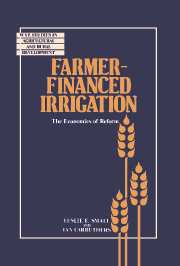Book contents
- Frontmatter
- Contents
- Preface
- 1 Irrigation financing in perspective
- Part I Analysing financing policies: theory and concepts
- Part II Criteria for evaluating irrigation financing policies
- Part III Financial autonomy and user fees: key implementation issues
- 9 Establishing financial autonomy
- 10 Setting irrigation fees: reconciling the need for funds with farmers' ability to pay
- 11 Collecting irrigation fees: fostering a willingness to pay
- 12 The political economy of irrigation financing
- 13 Conclusions and recommendations
- Notes
- Index
13 - Conclusions and recommendations
Published online by Cambridge University Press: 05 November 2011
- Frontmatter
- Contents
- Preface
- 1 Irrigation financing in perspective
- Part I Analysing financing policies: theory and concepts
- Part II Criteria for evaluating irrigation financing policies
- Part III Financial autonomy and user fees: key implementation issues
- 9 Establishing financial autonomy
- 10 Setting irrigation fees: reconciling the need for funds with farmers' ability to pay
- 11 Collecting irrigation fees: fostering a willingness to pay
- 12 The political economy of irrigation financing
- 13 Conclusions and recommendations
- Notes
- Index
Summary
As irrigation development in the Third World has proceeded over the past several decades, two problems have emerged. The first is an increasingly severe shortage of funds to operate and maintain the irrigation facilities and to rehabilitate and modernise old systems. The need for such funds has grown in conjunction with the increase in irrigated area resulting from the continued investment in irrigation. As the fiscal and debt problems of the 1980s have thrust themselves on many Third World nations, governments have encountered particularly severe difficulties in providing the needed funds.
The second pervasive problem of irrigation has been poor overall performance relative to expectations. These performance difficulties are generally attributed to deficiencies in irrigation management. Many of the deficiencies involve unsatisfactory procedures for operation and maintenance; however, some of these problems can in turn be traced to deficiencies in the investment process of planning, design and construction.
These two problems are related in one obvious way: inadequate funding for recurrent costs may make it impossible for an irrigation agency to operate and maintain the facilities in a satisfactory fashion. But the two problems are also related in a more subtle fashion. A government's policies for irrigation financing can affect the relationships among the various actors of an irrigation system and have a profound effect on their behaviour. Methods of financing recurrent costs of irrigation can thereby affect the quality of irrigation management and this in turn affects farmer investment and field management.
- Type
- Chapter
- Information
- Farmer-Financed IrrigationThe Economics of Reform, pp. 216 - 225Publisher: Cambridge University PressPrint publication year: 1991

